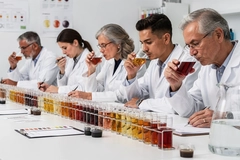
- Industry news
Industry news
- Category news
Category news
- Reports
- Key trends
- Multimedia
- Journal
- Events
- Suppliers
- Home
- Industry news
Industry news
- Category news
Category news
- Reports
- Key trends
- Multimedia
- Events
- Suppliers
Pureis’ lab-grown CBD nears full UK Novel Food authorization after safety review

Following a rigorous safety evaluation, Pureis’ lab-grown Ultra Pure CBD (cannabidiol) is now in the final stage of becoming a fully authorized novel food in the UK. The company has progressed to the public consultation phase of the licensing process, bringing it one step closer to the full commercialization of its product.
Pureis maintains that lab-grown CBD is less environmentally intensive, detached from crop failure, and easier to quality control.
This recent milestone follows the brand’s recognition as the first lab-made CBD label to receive a Positive Safety Assessment in the UK from the nation’s Food Standards Agency (FSA) in May 2024.
“We’re thrilled to be among the first CBD brands to enter this phase of the rigorous Novel Food process,” says Chanelle McCoy, CEO of Chanelle McCoy Health and the co-founder of Pureis.

“This progress is a testament to our dedication to provide consumers access to safe, certified CBD products, giving them the same confidence they have in other widely used supplements like chamomile, turmeric, and glucosamine — all of which have recognized wellness benefits.”
Based on its research, Pureis forecasts that the UK CBD market will reach £1 billion (~US$1.4 billion) by 2025.
As part of its next regulatory stage, the company will enter a 12-week public consultation, then finalize and submit its draft risk management recommendations for Ministerial approval.
Lab-made CBD moves into market
Their application has received a draft risk management recommendation and has now entered the public consultation phase, marking the last few steps toward potential full authorization for a Novel Food license.
This progress comes after a decade of time and significant investment in a comprehensive suite of Safety, Clinical, and toxicology studies to support its Novel Food application since its initial submission in January 2020.
“By becoming the first global authority to take these necessary steps, the FSA is paving the way for a safer, more responsible era for shopping for CBD in the UK,” advocates Pureis.
Pureis is registered in over 40 countries globally, categorizing its Lab-Made Ultra Pure CBD as a food supplement.
“We commend the FSA for its leadership as the first authority globally to move closer to formally regulating this category,” adds McCoy. “Their deep level of expertise and thorough review of our safety data has set a new global standard.”
“We are grateful for their guidance and hope that other international authorities will follow their lead to implement robust regulatory frameworks for CBD categories in their own countries.”
A Novel Food authorization or approval requires extensive safety studies to be carried out by internationally recognized clinical research organizations adhering to Good Laboratory Practice and Good Clinical Practice principles.
This includes clinical testing to ensure product purity and consistency, and toxicological evaluations to comply with all the consumer safety requirements.
Less eco-intensive and highly standardized
Pureis’ lab-made CBD food supplements are manufactured in the UK and contain 0% THC, while being “non-addictive and sustainably produced.” The brand’s “Ultra Pure” tagline reflects that it is free of pollutants, toxins, terpenes, heavy metals, pesticides, and other cannabinoids that can occur naturally in the cannabis plant.
CBD is classified as a Novel Food in the UK, which refers to food products that are either entirely new or produced using methods not previously used for human consumption. This category includes CBD, as it’s a relatively recent addition to the mainstream food market.
This regulatory focus is even more pronounced for lab-grown CBD, a synthetic form that is an even newer innovation than traditional, plant-derived CBD.
Pureis highlights that cannabis plant-derived CBD often contains multiple types of cannabinoids other than CBD — including psychoactive THC — making it nearly impossible to extract pure CBD from the cannabis plant.
“These other cannabinoids are all fighting to reach the same receptors and can dampen the effect of CBD, hence, why consumers might need a higher intake of plant-derived CBD to get the desired effect,” explains the company.
“An Ultra Pure CBD like Pureis will target the site of action without having to compete against other cannabinoids for the same receptor, hence why consumers don’t need as high an intake with lab-made CBD to get the desired effect, making 10 mg the optimum and established dose in the Pureis range.”
The company cites clinical evidence demonstrating its product has greater potency compared to plant-derived CBD. “Consumers do not need as high a dose with Pureis as with other CBD products on the market,” it claims.
Additionally, Pureis says its lab-grown product has “no concern about crop failure, no reliance on weather or soil conditions that affect the yield of plant-grown source, and minimal water usage.”
“There is no intra-batch variability, meaning each batch is exactly the same, which may differ in plant sources due to different harvest conditions.”










